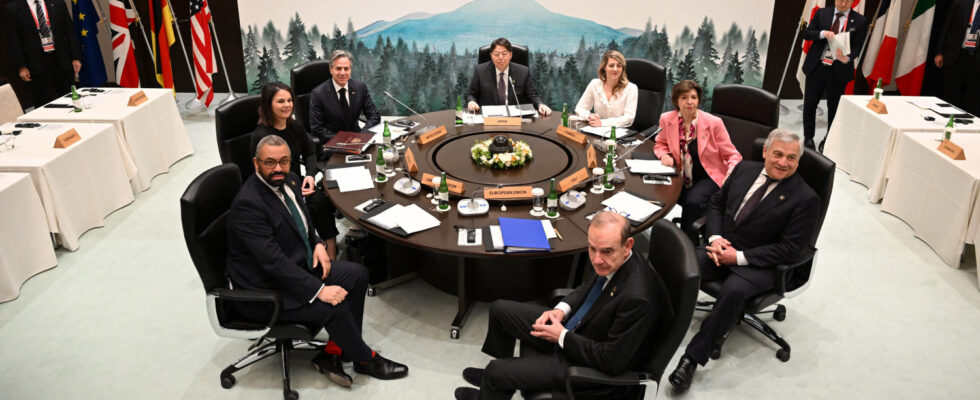The heads of the G7 diplomacy on Tuesday sternly warned the countries which would provide assistance to Russia in Ukraine, also presenting a united front against China, of which they condemned the maritime “activities of militarization”. Meeting since Sunday in Karuizawa in the Japanese Alps, the foreign ministers of the main industrialized countries have promised to make pay “the high price” to the countries which would provide assistance to Russia in its war against Ukraine.
They also pledged to continue to “intensify” sanctions against Russia and to redouble their efforts to prevent their circumvention by third countries. The final statement of their meeting also considers “unacceptable” the “irresponsible nuclear rhetoric” of Russia and its threat to deploy weapons in Belarus.
The G7 countries (France, Japan, United States, Canada, Germany, Italy, United Kingdom) also warned Beijing against its military ambitions in the South China Sea and underlined their unchanged position with regard to Taiwan, despite the turmoil linked to recent remarks by French President Emmanuel Macron.
The main information to remember:
– The G7 have warned countries wanting to help Russia in Ukraine
– The Brazilian President received Russian Foreign Minister Sergey Lavrov
Common firmness towards Beijing
During his visit to China in early April, the French president told the media that Europe should not be caught up in “crises that would not be (his)” in reference to Taiwan, which had irritated some allies of France before the Karuizawa meeting. “There is no change in the basic positions of the members of the G7 on Taiwan”, thus assure the chief diplomats of the group in their press release, considering “indispensable” the maintenance of peace and stability in the Strait of Taiwan.
French Foreign Minister Catherine Colonna and her counterparts have tried throughout the two days of talks in Japan to play down their differences, and their joint statement adopts strong language towards Beijing. Their text thus evokes the “concerns” of the G7 concerning “the continuous and accelerated expansion of China’s nuclear arsenal”, calling on it to work for “stability through greater transparency” on its nuclear weapons.
Without citing Beijing, the joint statement pledges to strengthen cooperation against “economic coercion”, consisting of restricting foreign trade or investment for political purposes. The warning against supporting Russia in Ukraine, without mentioning China, however, itself echoes repeated warnings by Western officials in Beijing against supplying arms to Russia.
Lavrov in Brazil, accused by Washington of “echoing Russian propaganda”
Brazilian President Luiz Inacio Lula da Silva received Russian Foreign Minister Sergey Lavrov on Monday to promote international mediation over the war in Ukraine, with Washington accusing Brazil of “echoing Russian and Chinese propaganda” on the conflict.
Sergei Lavrov, who is starting a Latin American tour in Brazil, met Lula at the Alvorada Palace, the official residence of the Brazilian head of state. This interview did not lead to the publication of an official press release. Before this meeting, the head of Russian diplomacy spoke at midday with his counterpart Mauro Vieira.
“We thank Brazil for its contribution to (the search for) a solution to this conflict,” he said at a press conference. He said that Moscow wanted “the conflict to end as soon as possible”, but nevertheless advocated a “lasting and not immediate” solution. Last week, Lula reiterated his intention to create a “G20 peace”, a group of countries whose goal would be to work for an end to the conflict in Ukraine.
He also said that Washington should “stop encouraging war and start talking about peace”. And “the European Union must start talking about peace”, had launched the Brazilian president Saturday in front of journalists in Beijing.
